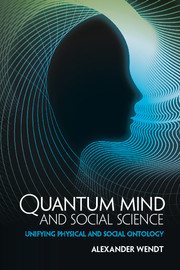Book contents
- Frontmatter
- Dedication
- Epigraph
- Contents
- Acknowledgments
- 1 Preface to a quantum social science
- Part I Quantum theory and its interpretation
- Part II Quantum consciousness and life
- Part III A quantum model of man
- 8 Quantum cognition and rational choice
- 9 Agency and quantum will
- 10 Non-local experience in time
- Part IV Language, light, and other minds
- Part V The agent-structure problem redux
- Conclusion
- Bibliography
- Index
9 - Agency and quantum will
from Part III - A quantum model of man
Published online by Cambridge University Press: 05 May 2015
- Frontmatter
- Dedication
- Epigraph
- Contents
- Acknowledgments
- 1 Preface to a quantum social science
- Part I Quantum theory and its interpretation
- Part II Quantum consciousness and life
- Part III A quantum model of man
- 8 Quantum cognition and rational choice
- 9 Agency and quantum will
- 10 Non-local experience in time
- Part IV Language, light, and other minds
- Part V The agent-structure problem redux
- Conclusion
- Bibliography
- Index
Summary
Quantum decision theory is a theory of choice behavior, and as such deals not just with Cognition but also with what I have separated out as Will. However, its advocates have concentrated on demonstrating that quantum preferences and beliefs, conceived as a kind of input, can predict observed behavioral outputs. As a result, they have not thematized what is going on in-between, the mechanism (sic) by which the quantum mind makes choices in the first place. In this way the theory, like its classical forerunner, selects a “basis vector” for thinking about people that is more on the terrain of Cognition than of Will. That makes sense as a first step, given that if the theory can't predict behavior then the rest is moot, but to get a more rounded quantum person we need to “rotate” to the basis of Will.
Will is the essence of agency, a power to animate and move the body – and the mind, in the form of attention – from the essentially passive stance of Cognition to active, purposeful engagement with the world. In Chapter 6, I equated this power with an aspect of wave function collapse, viewed as a process of temporal symmetry-breaking, in which advanced action moves through Will and retarded action through Experience. (Note that this means Will is not straightforwardly conscious, to which I return below.) If that is right, then Will and Experience are complementary in the quantum sense – incompatible, yet jointly necessary for a complete description of the collapse process – and so it will only be after reading the next chapter that the meaning of this one will be fully realized. If Will is an aspect of wave function collapse – one of the most incomprehensible features of quantum mechanics – then that may help explain why, compared to Cognition and even Experience, its standing among philosophers seems more tentative.
- Type
- Chapter
- Information
- Quantum Mind and Social ScienceUnifying Physical and Social Ontology, pp. 174 - 188Publisher: Cambridge University PressPrint publication year: 2015



